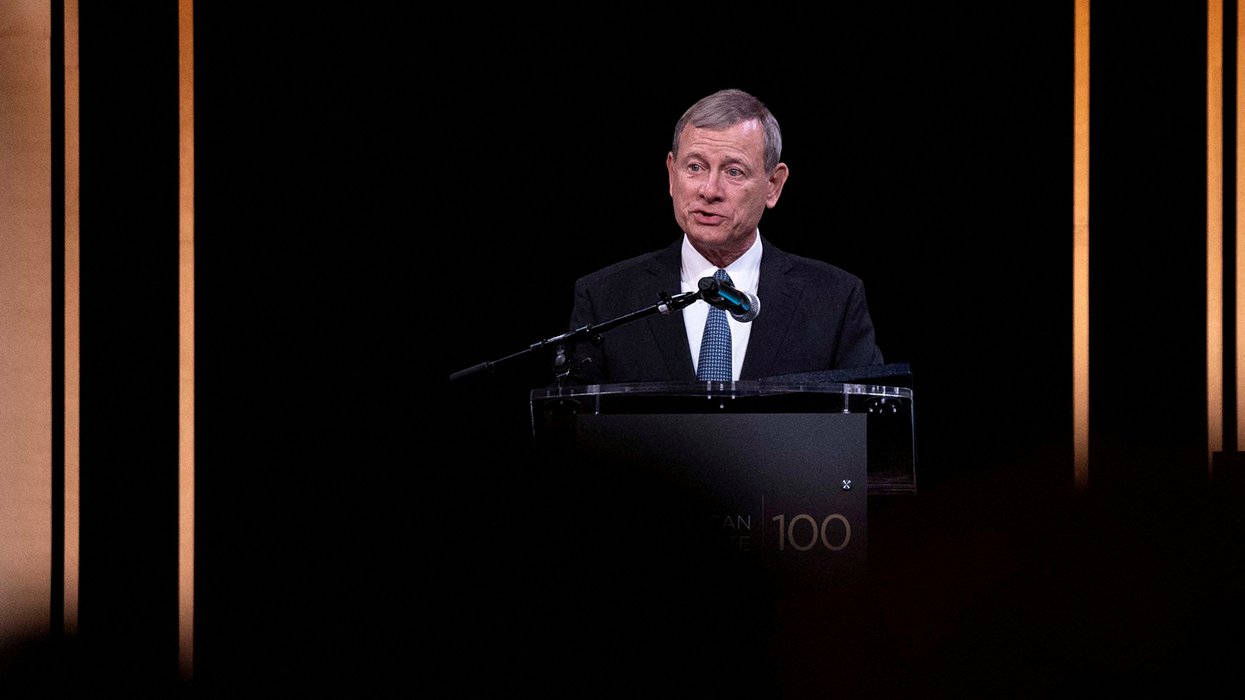Mother Jones writers Pema Levy and Ari Berman say that President Donald Trump "owes his corrupt and abusive reign to one man" — Supreme Court Chief Justice John Roberts.
"Twenty years ago, John Roberts promised that as chief justice of the Supreme Court, he would be like an umpire, calling balls and strikes," they write.
"His promise charmed senators and the media, who believed that his predilection for executive power and long-held antipathy for civil rights could be moderated by this commitment to faithfully apply the law," they add.
But Roberts wasn't what he seemed, they say.
"The delusion was so powerful that for two decades, the media defaulted to portraying him as a moderate institutionalist, pointing to high-profile decisions — to uphold parts of the Affordable Care Act or striking down President Donald Trump’s attempt to ask about citizenship in the 2020 census — in which he broke from conservative orthodoxy," they write.
Roberts, they say, is the sole reason for Trump's authoritarian streak.
"Today, as the Roberts court rewrites the Constitution in the image of Trumpian autocracy, it’s become clear that Roberts’ promise to be a neutral umpire was a lie. We are watching a rigged game, and Roberts set it up," they write.
"The Roberts court has spent Trump’s second term not applying the law so much as clearing it out of his way," they add.
Among the lawless actions Roberts has allowed: "firing independent agency commissioners, using racial profiling in immigration sweeps, disappearing immigrants to authoritarian and war-torn nations, and defying Congress’ power of the purse," they note.
But Roberts' "acquiescence to an anti-democratic America" isn't new, noting he "has been embedding white-dominant authoritarianism into the country’s source code for two decades. It’s impossible to imagine today’s crisis without the Roberts court having first undermined the foundations of our democracy."
Ryan Doerfler, a Harvard Law professor who studies the judiciary’s role in a democratic system, says that "You really can trace, in so many ways, the moment we’re in to critical decisions surrounding our law of democracy."
And much of that began with Roberts, who, "over the last five decades, has taken aim at the law, beginning as a young lawyer in President Ronald Reagan’s Justice Department fighting its reauthorization, when he claimed it would 'lead to a quota system in all areas,'" the Mother Jones writers explain.
"In 2019, Roberts toppled another pillar of democratic governance — if you don’t like a politician, you can vote them out — by writing in Rucho v. Common Cause that federal judges could not even review claims of partisan gerrymandering, deeming them 'political questions beyond the reach of the federal courts,'" they explain.
The writers also note that "Roberts didn’t just strip political power from ordinary people — he handed it to billionaires."
His decisive vote in 2010’s Citizens United v. FEC "lifted restrictions on political spending, while ludicrously insisting it would not 'lead to, or create the appearance of, quid pro quo corruption.' Political spending by billionaires has since increased 160-fold," they note.
That decision is "a direct line between the ruling and Elon Musk buying Trump the White House with more than $290 million and being given free rein to fire his companies’ regulators in return," they add.
In his nearly five decades in law, Roberts, they write, "didn’t wait till he was on the Supreme Court to empower Republican presidents — he auditioned for the job by showing his willingness to break the rules and come through for his team."
And under Trump, "we are now operating under a Robertsian reimagining of the separation of powers, in which laws passed by Congress are mere suggestions for a monarchical president," they explain.
"Trump needed Roberts to win, and Trump’s victory came just in time for Roberts," they add. "His corrupt bargain has had an exorbitant cost, both for the nation and the court’s reputation."
The writers agree, saying, today's court under Roberts "will greenlight Trump’s corrupt, self-enriching behavior and unlawful power grabs. The majority will instinctively know that its fate is tied to the fate of Trump’s movement, and so it will protect it. The result will be a democracy in name only."


